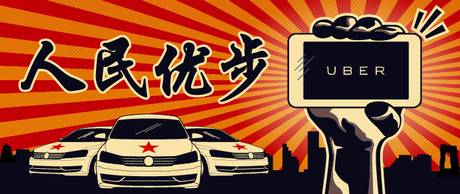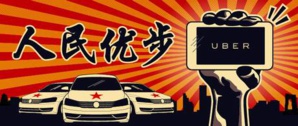The Chinese version was decided to be called Ruyue (translated as "by appointment"). The main difference between this app and Uber - with its help you can call cars from only four public taxis, competition with which recently caused a lot of trouble to Uber. The news on state service and the closure of local Uber appeared at the same time, what has created some doubts. Recall that the May 1, police raided Uber’s office in Guangzhou, which consists of two people. The office was closed and the equipment confiscated under the pretext that the company does not have a local business license. The office will not be open until the new license is issued, said Uber.
- It is difficult to say whether the police raid has any relation to the launch of a new application, but it would be natural to assume the existence of some links, - says CEO of iMedia, Internet consulting agency of Guangzhou, Zhang Li. - All of this seems to be clearing the field of activities for the public project."
State-owned companies dominate in many areas of China's economy. But they are facing increasingly tough competition from Internet projects that undermine the status quo in markets where state giants work ineffective. These include transport and financial services.
Taxi services, whether foreign or local Uber analogues versions, cause attention of regulators in many cities in China, where private tax service is prohibited. However, this is not unique to Asia. Uber is periodically prohibited or attempted to both in Europe and in America. Services alike bypass the ban on the public conveyance without a license, offering services not taxi but hire car with a personal driver. With one of the Uber service called People's Uber, which competes with cheap taxis, almost all trips are made on personal computers.
Experts say Uber is late to the section of the Chinese market for Taxi services and its present share is small, less than a percent. Although, Uber (with Audi cars and other high-class cars), or, precisely the app UberBlack, claim to hold a stronger position in the expensive segment of the market.
Ruyue is operated by Guangzhou center by public transport. The application is already running in test mode. Running has shown that theoretically any carrier can co-operate with Ruyue. But in practice, just four licensed taxis - Baiyun, Guangjun, Jiaotong and Lixin – were selected, according to the newspaper Southern Daily. Now it registered 3,000 machines. The city authorities have promised that the application will be available for download in a few weeks, but have not specified the exact date.
source: ft.com
- It is difficult to say whether the police raid has any relation to the launch of a new application, but it would be natural to assume the existence of some links, - says CEO of iMedia, Internet consulting agency of Guangzhou, Zhang Li. - All of this seems to be clearing the field of activities for the public project."
State-owned companies dominate in many areas of China's economy. But they are facing increasingly tough competition from Internet projects that undermine the status quo in markets where state giants work ineffective. These include transport and financial services.
Taxi services, whether foreign or local Uber analogues versions, cause attention of regulators in many cities in China, where private tax service is prohibited. However, this is not unique to Asia. Uber is periodically prohibited or attempted to both in Europe and in America. Services alike bypass the ban on the public conveyance without a license, offering services not taxi but hire car with a personal driver. With one of the Uber service called People's Uber, which competes with cheap taxis, almost all trips are made on personal computers.
Experts say Uber is late to the section of the Chinese market for Taxi services and its present share is small, less than a percent. Although, Uber (with Audi cars and other high-class cars), or, precisely the app UberBlack, claim to hold a stronger position in the expensive segment of the market.
Ruyue is operated by Guangzhou center by public transport. The application is already running in test mode. Running has shown that theoretically any carrier can co-operate with Ruyue. But in practice, just four licensed taxis - Baiyun, Guangjun, Jiaotong and Lixin – were selected, according to the newspaper Southern Daily. Now it registered 3,000 machines. The city authorities have promised that the application will be available for download in a few weeks, but have not specified the exact date.
source: ft.com






